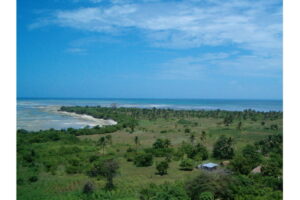
Uganda & Ethiopia are the only African countries that enjoy the market share
Recently, the chairperson Agriculture Council of Tanzania, Jacqueline Mkindi tweeted: “The Global coffee industry is thriving as its market size is projected to hit $151.92bn in 2028, up from $104.22bn in 2020, thanks to the rise in demand for specialty coffee. However, Uganda & Ethiopia are the only African countries that enjoy the market share. Food for thought”!
Yes, it’s certainly food for thought. Tanzania is a significant producer of coffee in Africa, but currently it has a smaller market share than other nations like Ethiopia and Uganda. Tanzania must make conscious efforts to enhance its market share in the global coffee market, which can reach $151.92 billion in 2028. After all, we have everything it takes to dominate the coffee market like adequate land and more people.
The Minister of Agriculture, Hon. Hussein Bashe recently addressed the issues facing the coffee trading system. He gave some clues as to why there is unsatisfactory performance in that subsector. Hon. Bashe noted that farmers were being underpaid and exploited by cooperatives through the present system.
The information provided on the prices of coffee didn’t amuse him, as he still noted that there were all signs that coffee farmers conned. Farmers having coffee of different quality and grades were all treated equally. This review of the trading system is a big step in ensuring that farmers are not exploited and thus receive fair compensation for their products.
As a nation, we must take a proactive approach to enhance our market share in the global coffee market by taking the necessary steps to improve the quality of our coffee, establish a strong brand, increase exports, diversify our coffee varieties, and invest in technology. We can position ourselves as a leading player in the global coffee industry.
To achieve this, we must first address the issues facing our coffee trading system. As highlighted by Agriculture Minister Hussein Bashe, farmers have been underpaid and exploited by cooperatives through the present system. That is unacceptable and needs immediate action. The decision to dispatch a team of experts to review the trading system and gather concerns from farmers is a step in the right direction.
We must improve the quality of our coffee while examining the trade mechanism. Specialty coffee is in high demand and has a higher price since it has a distinct and high-quality flavor. We can make our coffee of the finest quality by employing stringent quality control systems, investing in research & development, and training farmers on the best methods for growing and harvesting coffee.
We must also spend money on marketing and branding initiatives to develop a distinctive and recognizable brand that accurately reflects the caliber and originality of our coffee if we are to position ourselves as a premium product. That will enable us to stand out from the competition and attract more customers.
Additionally, in order to simplify exportation of our coffee, we must develop trade agreements with other nations and upgrade our logistics and transportation systems. With the aid of certifications, we will also be able to access new markets and attract more customers.
Along with taking these actions, we must also concentrate on expanding the kind of coffee we make. That will enable us to expand our markets and draw in additional customers. Likewise, if we invest in technology to raise the effectiveness and productivity of our coffee, we will be able to produce more coffee and expand our market share.
In conclusion, Tanzania may improve its market share in the global coffee industry and benefit from the growing demand for specialty coffee by adopting a proactive strategies and concentrating on those areas mentioned above. Let’s cooperate to take control of the coffee market since we have means to do it.
Share this news
This Year’s Most Read News Stories

Tanzania PS Wants Greater Public Awareness in Health Insurance
Dodoma — PERMANENT Secretary (PS) for Health Ministry, Prof Abel Makubi, said accomplishing universal health insurance requires greater awareness to members of the public before the programme kicks off on July 1, 2023.Continue Reading

Muslims in Pemba conduct special prayer against ZAA decision
ZANZIBAR: More than 200 Muslims in Vitongoji Village, South Pemba Region over the weekend conducted a special prayer to condemn the Zanzibar Airports Authority (ZAA) move to appoint DNATA as the sole ground handler in Terminal III of the International Airport of Zanzibar. Abeid Amani Karume.Continue Reading

Tanzania Declares End of Marburg Virus Disease Outbreak

Tanzania today declared the end of Marburg virus disease outbreak after recording no new cases over 42 days since the death of the last confirmed case on 28 January 2025.
The outbreak, in which two confirmed and eight probable cases were recorded (all deceased), was the second the country has experienced. Both this outbreak, which was declared on 20 January 2025, and the one in 2023 occurred in the north-eastern Kagera region.
In response to the latest outbreak, Tanzania’s health authorities set up coordination and response systems, with support from World Health Organization (WHO) and partners, at the national and regional levels and reinforced control measures to swiftly detect cases, enhance clinical care, infection prevention as well as strengthen collaboration with communities to raise awareness and help curb further spread of the virus.
Growing expertise in public health emergency response in the African region has been crucial in mounting effective outbreak control measures. Drawing on experience from the response to the 2023 Marburg virus disease outbreak, WHO worked closely with Tanzanian health authorities to rapidly scale up key measures such as disease surveillance and trained more than 1000 frontline health workers in contact tracing, clinical care and public health risk communication. The Organization also delivered over five tonnes of essential medical supplies and equipment.
“The dedication of frontline health workers and the efforts of the national authorities and our partners have paid off,” said Dr Charles Sagoe-Moses, WHO Representative in Tanzania. “While the outbreak has been declared over, we remain vigilant to respond swiftly if any cases are detected and are supporting ongoing efforts to provide psychosocial care to families affected by the outbreak.”
Building on the momentum during the acute phase of the outbreak response, measures have been put in place to reinforce the capacity of local health facilities to respond to potential future outbreaks. WHO and partners are procuring additional laboratory supplies and other equipment for disease detection and surveillance and other critical services.
Marburg virus disease is highly virulent and causes haemorrhagic fever. It belongs to the same family as the virus that causes Ebola virus disease. Illness caused by Marburg virus begins abruptly. Patients present with high fever, severe headache and severe malaise. They may develop severe haemorrhagic symptoms within seven days.
In the African region, previous outbreaks and sporadic cases have been reported in Angola, the Democratic Republic of the Congo, Ghana, Kenya, Equatorial Guinea, Rwanda, South Africa and Uganda.
Source: allafrica.com









